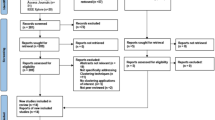Abstract
We recall the OWA operator and discuss some of the features used to characterize these operators. In passing we introduce an new characterizing attribute called the divergence. We then consider two cases of information fusion and use these as motivation to generalize the OWA operator with the introduction of the Heavy OWA operator. These HOWA operators differ from the ordinary OWA operators by relaxing the constraints on the associated weighting vector. We consider some applications of these HOWA operators and provide some examples of weighting vectors associated with these HOWA operators.
Similar content being viewed by others
References
Arrow, K. J. and L. Hurwicz. (1972). “An Optimality Criterion for Decision Making Under Ignorance.” In C. F. Carter and J. L. Ford (eds.), Uncertainty and Expectations in Economics. New Jersey: Kelley.
Bordogna, G. and G. Pasi. (1995). “Linguistic Aggregation Operators in Fuzzy Information Retrieval,” International Journal of Intelligent Systems 10, 233–248.
Bosc, P. and O. Pivert. (1995). “SQLf: A Relational Database Language for Fuzzy Quering,” IEEE Transactions on Fuzzy Systems 3, 1–17.
Bouchon-Meunier, B. and M. Rifqi. (1997). “OWA Operators and an Extension of the Contrast Model.” In R. R. Yager and J. Kacprzyk (eds.), The Ordered Averaging Operators: Theory and Applications. Boston: Kluwer Academic Publishers, 29–35.
Fedrizzi, M., J. Kacprzyk, and H. Nurmi. (1993). “Consensus Degrees Under Fuzzy Majorities and Fuzzy Preferences Using OWA Operators,” Control And Cybernetics 22, 71–80.
Herrera, F., E. Herrera-Viedma, and J. L. Verdegay. (1996). “Direct Approach Processes in Group Decision Making Using Linguistic OWA Operators,” Fuzzy Sets and Systems 79, 175–190.
Kacprzyk, J. and S. Zadrozny. (1997). “Implementation of OWA Operators in Fuzzy Querying for Microsoft Access.” In R. R. Yager and J. Kacprzyk (eds.), The Ordered Averaging Operators: Theory and Applications. Boston: Kluwer Academic Publishers, 293–306.
Luce, R. D. and H. Raiffa. (1967). Games and Decisions: Introduction and Critical Survey. New York: John Wiley & Sons.
Yager, R. R. (1988). “On Ordered Weighted Averaging Aggregation Operators in Multi-Criteria Decision Making,” IEEE Transactions on Systems, Man and Cybernetics 18, 183–190.
Yager, R. R. (1992). “Decision Making Under Dempster-Shafer Uncertainties,” International Journal of General Systems 20, 233–245.
Yager, R. R. (1993). “Families of OWA Operators,” Fuzzy Sets and Systems 59, 125–148.
Yager, R. R. (1996). “Quantifier Guided Aggregation Using OWA Operators,” International Journal of Intelligent Systems 11, 49–73.
Yager, R. R. and J. Kacprzyk. (1997). The Ordered Weighted Averaging Operators: Theory and Applications. Norwell, MA: Kluwer.
Author information
Authors and Affiliations
Rights and permissions
About this article
Cite this article
Yager, R.R. Heavy OWA Operators. Fuzzy Optimization and Decision Making 1, 379–397 (2002). https://doi.org/10.1023/A:1020959313432
Issue Date:
DOI: https://doi.org/10.1023/A:1020959313432




